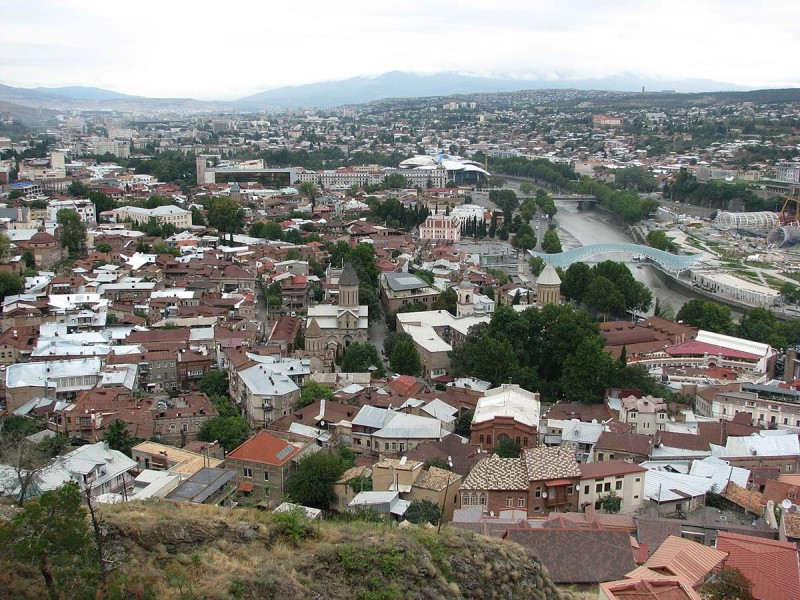Darkness had fallen on the Azerbaijani capital of Baku when investigative journalist Elmar Huseynov arrived home from work on March 2, 2005. It wasn't uncommon for Huseynov to stay at the offices of The Monitor, the magazine he edited, until after sundown.
The stairwell was especially dark that evening because a light above his apartment door wasn’t working. As Huseynov made his way to the third floor, an assassin armed with a semi-automatic pistol emerged out of the darkness above him. Seven shots rang out. Six bullets found their target. The fatal one pierced the top left-hand side of Huseynov’s chest, ripping through blood vessels and puncturing a lung.
Huseynov managed to stagger to his apartment, where his wife, father, and sister had been waiting for him. As the door swung open, he collapsed in the entryway.
As news of the attack spread, TV journalist Chingiz Sultansoy, a friend of Huseynov’s, hurried to the scene after taking a call from a concerned colleague. Police officers stood outside the building, and a crowd was gathering. Suddenly, Sultanoy remembers, Huseynov’s wife Rushaniya flung open a window. “They’ve killed him,” she screamed.
The police moved aside, letting journalists, neighbors, and friends enter and leave. Sultansoy climbed the same stairs Huseynov had ascended not long before and saw the apartment door ajar. His friend was lying a few feet inside, his belly poking out from his sweater, blood smeared on his face. Sultansoy knelt and took Huseynov’s still-warm hand. Seeing for himself that his friend was dead, he kissed him and left.
Huseynov’s reporting had targeted Azerbaijan’s elite, from politicians to big business. Long before his death, he had been subjected to intimidation and threats on his life. Since that night, his friends and family have speculated about whether powerful individuals had sought to neutralize him.
“The pattern of pressure against Elmar in the run-up to his assassination bears similar hallmarks to many cases we have seen in other countries, in which journalists were deliberately targeted,” said Rebecca Vincent, a former U.S. diplomat posted to Baku in the aftermath of Huseynov’s murder and now director of international campaigns for Reporters Without Borders (RSF).
On the 16th anniversary of Huseynov’s murder, OCCRP can shine new light on the murky investigation into the killing. Drawing on court filings and other documents obtained via freedom-of-information requests, our reporting includes an examination of a previously unpublished file from the FBI, which had been called in to help investigate.
The information lays out a catalogue of obfuscations and missteps since 2005, largely made by the Azerbaijani authorities who were meant to be responsible for bringing Huseynov’s killer or killers to justice. As the case remains unsolved, OCCRP has found that a key suspect remains at liberty, while Azerbaijan has appeared to mislead Husyenov’s family on the investigation’s status. As a result, an already troubling affair may have even graver implications for Azerbaijan’s steadily shrinking space for press freedom.
“A Black Spot”
By March 2005, press freedom in Azerbaijan had already come under significant pressure from President Ilham Aliyev, who’d taken the reins of the South Caucasus nation from his father a year and a half earlier. Eight journalists had been arrested since the younger Aliyev had come to power, and with a parliamentary election due in November 2005, the media was bracing for further confrontation. That year, Azerbaijan ranked 141st of 167 countries on RSF’s Worldwide Press Freedom Index.
The Monitor, Huseynov’s outlet, was known for its stinging reporting on corruption, which included taking aim at the president and his family. When rumors swirled that Huseynov had been silenced by powerful people, Aliyev strongly refuted suggestions that his family or its allies were involved. Decrying the crime as a “black spot” on Azerbaijan’s history, he promised a robust investigation, and put a call in to the then-U.S. Ambassador to Azerbaijan Reno Harnish, to enlist expert help from the U.S. Federal Bureau of Investigation (FBI).
“This crime must be investigated thoroughly and the criminals must be called to account,” he said the day after the murder.
On the ground in Baku, the FBI would later meet with the lead investigators and Azerbaijani ministers, visit the crime scene, review the existing evidence and initial autopsy reports, and gather evidence themselves.
But from the start, the investigation was dogged by an apparent unwillingness by Azerbaijani officials to focus on whether Huseynov had been killed because of his journalism. Instead, ministers in charge of the probe fixated on unsubstantiated claims that Armenia had ordered the killing to harm Azerbaijan’s government.
Sixteen years later, one of the murder suspects appears to live freely in Georgia, acquiring property interests in Tbilisi and a plot of land in Marneuli, in the country’s south. And although Azerbaijan’s Ministry for National Security insisted to Rushaniya Huseynova that its inquiries were ongoing, officials were telling the FBI, over the same time period, that the case was stalled.
While authorities were getting nowhere, Huseynov’s killing had an instant impact, according to RSF’s Vincent. The murder of one of the country’s best-known reporters sparked fear among other probing journalists that they could be next.
“Elmar's case was particularly emblematic, not only in Azerbaijan, but throughout the region,” she said. “His targeting was no doubt intended to send a clear signal not to cross certain red lines, and was effective in creating a chilling effect that can still be felt to this day.”
FBI Misgivings
The FBI case file into the murder, which the agency noted was so serious that “it could topple” the government, was compiled between 2005 and 2008. Seen by OCCRP, it reveals serious misgivings on the part of Legal Attaché Bryan Paarmann, who noted missed opportunities right from the start.
Paarmann pointed to basic failures in crime scene control on the night of the killing, when police failed to stop members of the public from laying a trail of flowers on the blood in the stairwell, destroying any possibility that tread or footwear evidence could be gathered.
Crime scene photographs seemed to have been taken long after any evidence was removed, a “very poor procedural error,” Paarmann wrote. The recovery team, he added, did not even wear gloves when recovering a key piece of evidence.
After discovering that Huseynov’s hallway had been darker than usual that night because a lightbulb above his door was not sitting properly in its socket, Paarmann noted that local investigators had failed to test that area for prints.
“[I] inquired as to whether this bulb had been processed for latent fingerprints and was informed that too many people had touched it therefore this was deemed as non productive,” he wrote.
In regard to Huseynov’s autopsy, Paarmann asked whether fingernail scrapings had been taken to check for skin samples that could identify the killer. He was told yes, this had been done, but the results had come back negative. However, he could find “no mention of this procedure” in initial reports provided by the Azerbaijanis.
Despite all this, some leads did appear promising.
The day after the murder, a 5.45mm Baikal PSM semi-automatic pistol was found, sitting in plain view in a planter in front of Huseynov’s building. It still bore all its serial markings, which indicated it had been manufactured in Russia. Shortly afterwards, a dark-colored knit skullcap was recovered from another planter nearby.
The murder seemed “hasty and sloppily executed,” Paarmann wrote, the marksmanship poor. The weapon was found where it was “sure to be discovered,” with its markings clearly legible. The government of Azerbaijan felt the hit was carried out by a “skilled individual,” but a professional would have destroyed the markings and disassembled the gun, Paarmann reasoned.
But if he took hope from the fact that investigators were dealing with, in his words, “a possible amateur,” the FBI attaché was concerned by the attitude of Azerbaijani ministers.
Though they admitted there were several possible avenues of investigation, Paarmann appeared to grow frustrated as they obsessed over a theory that a foreign country had ordered a hit on Huseynov to sow chaos in Azerbaijan. At the top of the ministers’ list of possible perpetrators was Armenia, with Russia and Iran considered possibilities.
“The assembled ministers did acknowledge that the motive for this murder could have been purely personal or retaliation for Huseynov’s inflammatory journalistic positions, but spent a vast majority of their time enumerating why they believed it to be a coordinated, foreign-sponsored assassination aimed at destabilizing the government,” he wrote.
Paarmann wrote that government officials were doing “several things correctly,” but his early conclusions were damning.
“[I am] concerned with the premature focus on one theory of the crime and that it may lead to an attempt to make the facts fit that theory instead of a reasoned, methodical and unbiased investigation with utilization of logical, deductive reasoning towards a defensible conclusion,” he wrote.
When he made a raft of recommendations to Azerbaijan’s investigators, he was told they would “take them into consideration.” Instead, the FBI found itself slowly sidelined.
Two Suspects
Two months into the investigation, authorities had identified two suspects: Tahir Khubanov and Teimuraz Aliyev. Both citizens of neighboring Georgia, they had rented an apartment near Huseynov’s home in the period before the killing, and later crossed back over the Azerbaijan-Georgia border.
When Azerbaijani investigators recovered two pillowcases and clothing from their Baku apartment, the FBI matched DNA from these items with the cap found at the crime scene, which authorities said linked both men to the murder. The FBI described the evidence against the men as “strong,” but nothing has emerged to indicate that either man had a connection to the subjects of Huseynov’s journalism, leaving any possible motive a mystery.
A search was launched, but Azerbaijani authorities seemed reluctant to run images of the two men online. A July 2005 report from news agency Turan quoted officials as saying there was “no necessity in placing pictures of these people on the internet.”
Aliyev was finally located in Georgia, and denied involvement when interrogated by Georgian authorities in September 2006. The waters had been muddied, too, after former Azerbaijan Ministry of Interior official Haji Mamedov, on trial for several unrelated killings, claimed in the summer of 2006 that his hit squad had killed Huseynov. To help clear things up, in January 2007 the FBI offered to perform a polygraph test on Aliyev.
An FBI assistant legal attaché wrote to Azerbaijan’s then-Minister of National Security Eldar Mahmudov, saying Aliyev and the other suspect were likely still in Georgia and that Georgian authorities would probably cooperate.
An internal letter from the FBI to U.S. Ambassador to Azerbaijan Anne Derse, however, suggests the FBI saw Azerbaijan’s cooperation as a “hurdle” to getting the polygraph done. The FBI case file contains no evidence that it ever took place, and the investigation stagnated.
After the attaché met with the Ministry of National Security in September 2008, he wrote: “The [ministry] advised that their investigation has stalled and they do not have further need of FBI assistance.” Yet just a few months earlier, in July, ministry officials had told Rushaniya they were working tirelessly to bring the killers to justice. A senior official wrote to her lawyer: “At the moment a total, comprehensive and objective investigation of the case is being carried out.”
In March 2009, as Rushaniya persisted with her inquiries, she received another letter of response from a senior ministry official. Once more, he confirmed the investigation was ongoing. But he added, too, that the “preliminary investigation” had been extended to September 2009. This last detail is significant because by law, Rushaniya was only entitled to see case materials after any preliminary investigation was finished. Her lawyer would later point out that it seemed strange, four years after the murder and long after Azerbaijani authorities identified key suspects, that they would claim that the preliminary investigation was still ongoing. Writing a court submission, he said that this was “not likely” to be the case.
RSF’s Vincent said authorities in Azerbaijan “appear to have intentionally obstructed the pursuit of justice,” adding that the new documents “show, at best, a lack of political will to secure justice — or perhaps worse, a more sinister attempt to distract, deflect, and obstruct the criminal investigation.”
Apartments in Tbilisi
Though officials in Azerbaijan told Rushaniya in a 2009 letter that they were still looking for Khubanov and Aliyev, there were at least clues to the latter man’s location.
A simple public records search by OCCRP showed that somebody using Aliyev’s ID bought two apartments in Tbilisi, one in May 2008 and another in June 2008. The apartments were in a building occupied by several members of his immediate family, including his mother. OCCRP asked Azerbaijani authorities if they pursued this lead, but the request for comment went unanswered. Aliyev did not respond to written questions from OCCRP, which were hand-delivered to the building and received by a relative.
And on March 17, 2009, the same day the Ministry of National Security wrote to Rushaniya, Interpol wrote to the ministry with information that Aliyev was based in Tbilisi. Of Khubanov, there was no news.
It remains unclear from case files whether Azeri authorities relayed this information to Rushaniya, who declined to comment for this article.
She eventually brought a case to the European Court of Human Rights (ECHR) in 2010. In their responses to her allegations in that case file, Azeri authorities pointed out that they had in fact asked for the extradition of Aliyev and Khubanov, but claimed that Georgia refused because they were Georgian citizens. The filings indicate Azerbaijan made this request to Georgia in 2005.
Azerbaijani authorities did not respond to a question on whether they ever made further requests. However, the ECHR’s 2017 ruling pointed out that Georgia’s Deputy Prosecutor General had told Azerbaijan in 2005 that he was willing to start criminal proceedings against Aliyev within the Georgian justice system.
In other words, Aliyev could have been prosecuted if Azerbaijan had transferred the case to Georgia. Documents show that Georgia appears to have begun initial proceedings, but nothing came of them.
Uncomfortable Questions
Rushaniya’s lawyer, Knut Rognlien, told the ECHR that when Azerbaijani authorities insisted that the suspects were foreigners who couldn’t be found or spoken to, they were simply avoiding uncomfortable questions. The same types of questions, according to the FBI file, that ministers had dodged right from the start.
“Had they been apprehended, Teimuraz Aliyev and Tahir Khubanov could also have been interrogated regarding possible contact with authorities and their motive for the murder,” Rognlien wrote.
Those who knew Huseynov say the impunity surrounding the case continues to do serious damage to press freedom in Azerbaijan.
Steinar Gil, Norway’s ambassador to Azerbaijan at the time of the killing, called it “a warning that journalists who want to criticize openly and stand for the values of the free press would be at risk.”
Aliyev is still going about his life today, while no trace of Khubanov has been found. The only person ever jailed in relation to the murder, Turgay Bayramov, was sentenced to two years in prison for buying a phone for the two men.
In response to a request for further information from OCCRP, Georgian prosecutors referred reporters back to the ECHR’s ruling. Azerbaijani prosecutors did not respond to a similar request.
Even as the investigation has stalled, three more reporters have died in the line of duty in Azerbaijan since Huseynov was gunned down on the darkened steps to his apartment. Azerbaijan has dropped to 168th of 180 countries on RSF’s World Press Freedom Index.
“There is no media freedom in Azerbaijan today,” Gil said. “It’s zero, none. After this, people would think ‘If this happened to Elmar, it could happen to anyone.’"
Eleanor Rose is an investigative journalist based in London who specializes in human rights and has written for the Guardian, the Evening Standard, and the Independent, among other publications.
Aidan Iusubova (iFact) contributed reporting.







